June 16, 2020
I've seen it all too often with many of my personal coaching clients. Otherwise healthy men and women come to me ready to throw in the towel because—after dialing in their diet and exercise regimens—they still aren't seeing the results they're working tirelessly to achieve. When this happens, there's often one common denominator, and that is stress—but more specifically, a lack of incorporating stress management techniques into their routines.
Let’s face it, stress is at an all-time high for most right now. Millions of Americans have lost their jobs, the economy is in the gutter, the future is uncertain, fear is widespread, relationships are strained, division is pervasive—add to that the recent civil unrest and you’ve got the perfect recipe for high stress.
The scariest part is, you might not even know you're stressed. Your body gets accustomed to living in a chronically stressed state, and the host of negative health effects you may experience as a result are often blamed on “just getting older,” “overtraining,” “not getting enough sleep,” or whatever other excuses your brain may conjure up. While there are many ways to combat high stress (including breathing techniques, improving sleep quality, improving gut health, removing toxic body care products, laughing, singing, listening to music, improving vagal nerve tone, etc.), many of which I've discussed in the following podcasts and articles, including…
- The Single Biggest Contributor To Poor Health And How To Combat It With Heart Rate Variability (HRV) Training.
- The Ultimate Breathwork Ninja Guide: How To Banish Stress & Kiss High Cortisol Goodbye
- Cortisol Decoded: The Myths & Truths About A Hormone Crucial To Your Health & Survival.
- 7 Signs Your Cortisol And Adrenals Are Broken.
- Forest Bathing, Sleep Hacking, Cell Phones & Water: The Underground Guide To Lowering Cortisol When Nothing Else Seems To Be Working.
- Banish Stress and Kiss High Cortisol Goodbye
- Natural Stress Management Techniques You Can Use Today
- The 7 Best Stress-Fighting Weapons That Will Make Your Mind-Body Connection 100% Bulletproof
…one of the best ways is by adopting a cortisol (aka stress hormone) lowering diet and choosing some key supplements proven to lower cortisol. So in today's article, you'll discover the science behind what stress is and what causes it; the connection between stress, cortisol, and the HPA axis; and finally, a list of my top proven supplements and foods that reduce cortisol.
What Causes Stress?
To put it simply, stress is a non-specific response by your body to any demand for change—essentially, a disturbance of homeostasis or your internal equilibrium.
While stress often carries a negative connotation, it is a far-reaching phenomenon that can actually be both beneficial and detrimental to your health.
Good stress is called “hormetic” stress, which is a low dose of a chemical agent or environmental factor that results in an adaptive beneficial effect on your body, (but this same agent or factor at higher doses would pose detrimental effects to you). The term “hormesis” was first used in the 1940s to describe the stimulatory effect (“hormesis” is derived from hormáein, an ancient Greek word meaning “to excite,” or “to set in motion”) that red-cedar heartwood extract had on a cultured fungus, whose growth was inhibited by high concentrations of the same extract.
For example, exercise, which can be detrimental when overdone, is beneficial in relatively small, controlled doses. Other examples of hormetic stress are extreme temperatures, fasting, oxygen deprivation, sun exposure, plant phytochemicals, adversity, low levels of radiation (stay tuned to my newsletter for the upcoming podcast “Is Radiation Actually Good For You? The Hormesis Effect, The Healing Power of Radioactive Stones, Ozone Therapy & Much More With Jane Goldberg.“), and exposure to some bacteria and germs. Your body is designed to handle occasional minor stress, and this adaptive response actually makes you more resilient. This is because a small dose of a toxin (chemical agent or environmental factor) has the ability to trigger certain repair mechanisms within your body; and, once activated, these mechanisms then offset the toxin's effect.
It’s only when these stressors are experienced too much, for too long, and exceeds personal and social resources available that they become harmful. Because the modern world is rampant with stress coming at you from every possible angle—physical stress from lack of sleep (stay tuned to my newsletter for an article on “hacking sleep” next week), chronic infections and injury; chemical stress from drugs, alcohol, caffeine, and nicotine; environmental stress from air pollution, cleaning chemicals, poor water quality, EMFs, and pesticides; mental stress from anxiety, depression, anger, guilt, loneliness, and fear; nutritional stress from vitamin and mineral deficiencies, blood sugar swings, gut dysfunction, and food intolerances; and spiritual stress from troubled relationships, financial, and career pressures—being stressed to a detrimental degree is seemingly unavoidable.
Add to this smartphones, kids, errands, traffic, and you’ll see that stress is nearly constant. Unless you are actively managing your stress by practicing breathwork or yoga, getting a good night's sleep, removing toxic body care products, etc., you may suffer from detrimental health effects as a result of chronically high cortisol and hypothalamic pituitary adrenal (HPA) axis dysfunction. (More on this below.)
For more on hormesis, check out my previous podcast episodes “How To Do Wim Hof Breathing “The Right Way,” Making Your Own DMT, Inhaling Pure Carbon Dioxide, Cold Showers, MDMA, & Much More – The Keys to Human Resilience.” and “What Doesn’t Kill Us: Why Your Body Needs Freezing Water, Extreme Altitude & Environmental Conditioning.”
The Cortisol / Stress / HPA Axis Connection
The main hormone associated with stress is cortisol, a crucial hormone normally released in a specific rhythm throughout the day. Nearly every bodily cell has cortisol receptors. Cortisol and the functions of the HPA axis help control energy levels, blood sugar levels, the sleep/wake cycle, metabolism, inflammation, memory, and blood pressure.
When you experience more than a few minutes of stress, increased cortisol is released to activate the flight, flight, or freeze response and prime your body to deal with the perceived danger.
Cortisol released in times of stress increases your heart rate, blood pressure, blood glucose, respiration, and muscle tension, while also temporarily shutting down the body’s hormonal systems that are not needed in times of crisis like those that regulate growth, reproduction, metabolism, and immunity. So how does this all work?
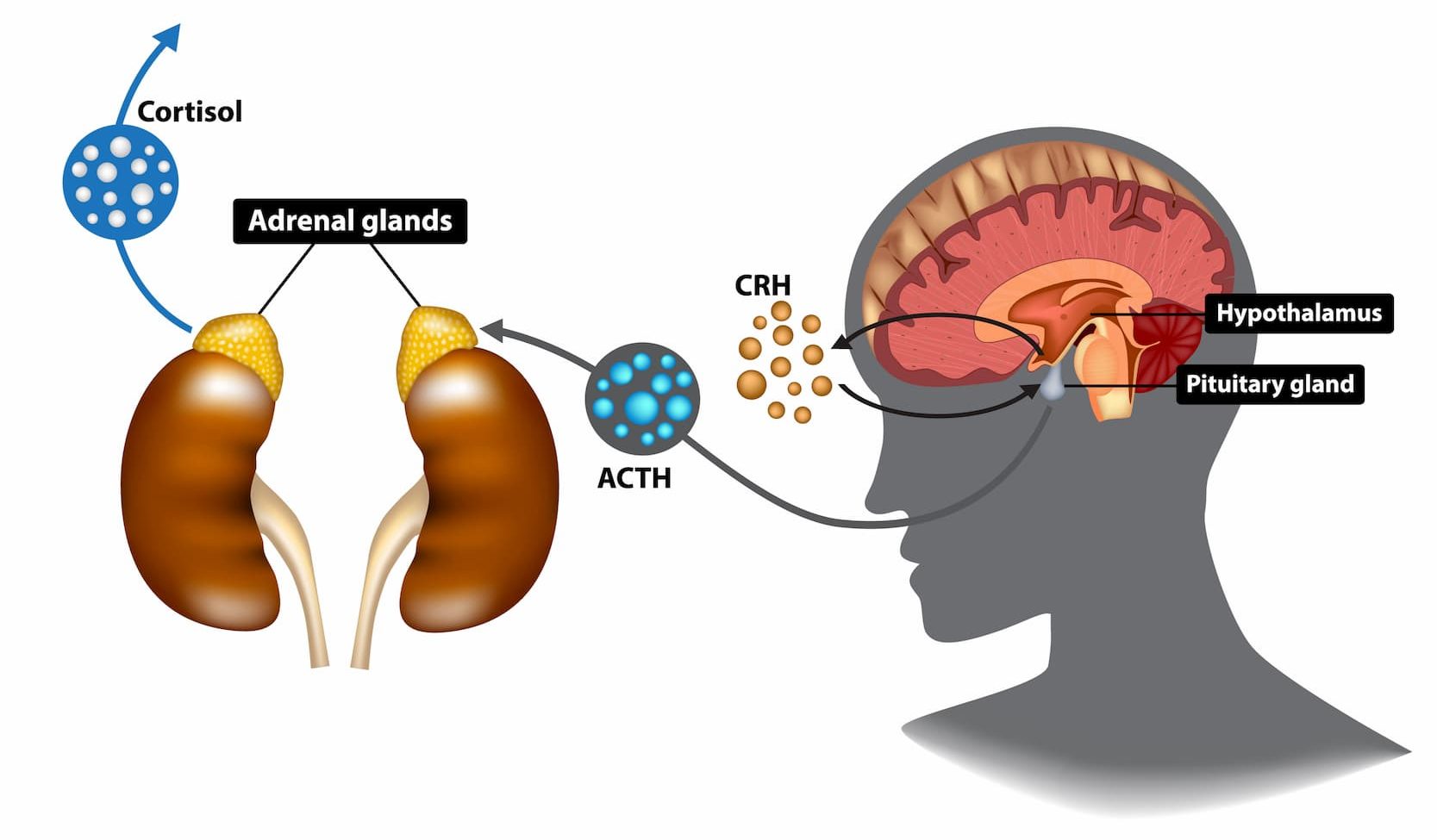 Your hypothalamus releases corticotropin-releasing hormone (CRH), which then binds to CRH receptors on your pituitary gland, thereby releasing adrenocorticotropic hormone (ACTH). ACTH binds to receptors on your adrenal glands stimulating the release of cortisol. Cortisol then puts the brakes on bodily functions that are nonessential (digestive and reproductive systems for example) allowing your body to have a “fighting” chance against whatever stressor it is facing. With repeated exposure to stress, your body gets used to the stressors, resulting in sustained HPA axis activation.
Your hypothalamus releases corticotropin-releasing hormone (CRH), which then binds to CRH receptors on your pituitary gland, thereby releasing adrenocorticotropic hormone (ACTH). ACTH binds to receptors on your adrenal glands stimulating the release of cortisol. Cortisol then puts the brakes on bodily functions that are nonessential (digestive and reproductive systems for example) allowing your body to have a “fighting” chance against whatever stressor it is facing. With repeated exposure to stress, your body gets used to the stressors, resulting in sustained HPA axis activation.
In fact, certain stressful life events have been associated with the most common chronic disorders of the digestive system, including functional gastrointestinal disorders, inflammatory bowel disease, gastro-oesophageal reflux disease, and peptic ulcer disease. As I just mentioned, stress is especially devastating to the female reproductive system. Chronic stress can lead to a drop in sex drive as well as a drop in fertility. Stress raises levels of stress hormones such as cortisol that inhibit the body's main sex hormone, gonadotropin-releasing hormone (GnRH), and subsequently suppresses sperm production, ovulation, and sexual activity; so if you’re trying to get pregnant, managing stress is necessary for both partners.
Generally, after times of stress, your body will return back to balance. But when you’re constantly under stress and the HPA axis is overproducing cortisol, adrenaline, and other hormones, this can wreak havoc on important bodily functions. Therefore, it is important to support healthy cortisol levels in order to ensure the hypothalamus and pituitary glands maintain the appropriate level of sensitivity to the negative feedback of cortisol. Check out my podcast with Dr. Craig Koniver, “Cortisol Decoded: The Myths & Truths About A Hormone Crucial To Your Health & Survival.” for a deep, deep dive into all things cortisol.
Some of the more harmful effects of chronic stress include…
- A weakened immune system
- Elevated blood sugar
- Sugar cravings
- Reduced fat-burning
- Hormonal imbalance
- Reduced DHEA, testosterone, TSH, and growth hormone
- Increased stomach fat.
- Fatty liver.
- Depression, anxiety, mood imbalances, neurotransmitter imbalances
- Cardiovascular disease
- Insulin resistance and diabetes
- Osteoporosis
- Sleep disturbances
- Inflammation
- Weight gain
- Digestive problems
- Memory and concentration problems
- And more
In low-stressed individuals, cortisol levels are normal and healthy, and adjustments of the HPA axis occur in a balanced manner. The stress response feedback loop is a system of checks and balances, one component inhibiting the function of another when it is necessary. It is when this balance is chronically off that negative health effects appear.
There are many ways to heal HPA axis dysfunction that results from chronic stress. A potent way to do this is to lower cortisol through supplementation, but there are plenty of potent foods that reduce cortisol as well. Before you dive in to some of the following foods and supplements, you may want to test your cortisol levels to ensure that any changes you make are paying off. My top pick for this is the DUTCH Urine Steroid Hormone Profile. Because hormone levels fluctuate constantly, this test is performed via multiple collections throughout the day—all from the comfort of your home. It is the most cutting-edge way to truly see what’s going on with your hormones.
Supplements And Foods That Reduce Cortisol
Because excessive and chronic stress can result from and create a vicious cycle of inflammation, imbalanced neurotransmitters, and poor nutritional status, it can also be reversed (or at least significantly mitigated) by food and supplements that support healthy levels of all of these.
Cortisol reduces inflammation in the body, so when chronic inflammation from poor diet and stress keep cortisol levels high, glucocorticoid receptor resistance (GCR) occurs, resulting in your body's failure to downregulate its inflammatory response.
Chronic inflammation and the resulting stress and high cortisol are at the root of most modern diseases. Therefore, a whole foods, anti-inflammatory, nutrient-dense diet is best for stress management. If you have known food sensitivities or suspect that you do, figuring this out and then avoiding those foods will play a huge part in reducing inflammation. Check out the Paleo Autoimmune Protocol to learn more about how to do this.
HPA axis dysfunction is also related to neurotransmitter imbalances, so eating foods that support this balance will help quell cortisol release. Neurotransmitters are primarily comprised of amino acids, B vitamins, and minerals. A deficiency of any of these three crucial compounds can leave you with inadequate neurotransmitter building blocks. The main vitamins associated with cortisol are B vitamins, mainly due to their use in the GABAergic system and GABA’s control of cortisol, vitamin C, and vitamin D.
Before I go into foods that reduce cortisol, it's important to first mention which foods you should avoid. Sugar, processed foods, refined carbohydrates, inflammatory fats like trans fats and vegetable and seed oils high in omega-6s, alcohol, and caffeine can all elevate cortisol levels. And no, you don't have to give up your trusty cup of black liquid gold; simply abstaining from caffeine (I switch to this decaf from my Mom's coffeeshop in Idaho for about a week, once per month or so) will also do the trick. If you're going to drink decaf, be sure to choose a brand that's organic and Swiss water processed, which avoids using harsh chemicals other decaffeinating methods use. A whole-foods diet including plenty of vegetables, pasture-raised meat and eggs, and wild-caught fish is best. Here are some of my suggestions:
Foods That Reduce Cortisol
- Omega-3-rich Foods – Studies have shown that lower levels of omega-3s are related to cortisol dysregulation and inflammation. Keep in mind that animal foods have superior omega-3s. Foods that are high in omega-3s are:
- B Vitamin-rich Foods – B vitamins are used to produce the hormonal cascade of the HPA axis that includes cortisol. Studies show that intake of B-vitamins, especially B6 (pyridoxine), B9 (folate), and B12 (cobalamin/cyanocobalamin) has positive effects on mood and stress. The most important B vitamins that are involved in the HPA axis cascade are B3 (niacin), B5 (pantothenic acid) and B6 (pyridoxine). B vitamin-rich foods that reduce cortisol include:
- Leafy greens such as spinach, collard greens, turnip greens, and romaine lettuce contain high amounts of B9.
- Liver and other organ meats are jam-packed with B vitamins. (Ancestral Supplements and PaleoValley carry organ meat capsules if you can't get into eating the meat. Also, check out my article here for more on how to source the healthiest organ meats.)
- Pasture-raised beef.
- Oysters, clams, and mussels contain huge amounts of B12 as well as B1, B2, B3, and B9.
- Legumes like edamame, lentils, chickpeas, and black beans contain high amounts of folate (B9).
- Chicken and turkey have high amounts of B3 and B6 as well as B2, B5, and B12.
- Yogurt is high in B2 and B12.
- Nutritional and brewer’s yeast contain very high amounts of B1, B2, B3, B6, B9, and B12.
- Vitamin C-rich Foods – Vitamin C is rapidly used in the production of cortisol and therefore necessary for proper HPA axis function. Vitamin C deficiency is related to high levels of cortisol, and vitamin C reduces cortisol. Foods high in vitamin C include:
- Citrus fruits like oranges, lemons, and grapefruit
- Broccoli
- Cauliflower
- Brussels sprouts
- Bell peppers
- Kale
- Tomatoes
- Strawberries
- Blueberries
- Kiwi
- Papaya
- Black currant
- Mango
- Pineapple
- Probiotics and Prebiotics – Probiotics and prebiotics both have been shown to reduce cortisol. This is due to the intimate connection between the gut and adrenal function. Note: If you have SIBO, exercise caution with prebiotic and probiotic foods. Read more about why in this article. Probiotic-rich foods that reduce cortisol to include in your diet are:
- Prebiotic-rich foods include:
- Magnesium-rich Foods – Magnesium deficiency induces anxiety and HPA axis dysregulation. Foods high in magnesium include:
- Dried apricots
- Dark chocolate
- Avocados
- Nuts & seeds
- Legumes
- Leafy greens
- Olive Oil – Studies in rats show that oleuropein in olive oil boosts testosterone and metabolism and lowers cortisol. Make sure you get real olive oil from a trusted source though. Check out my podcast “What Olive Oil Should Taste Like, The Scary Truth About Olive Oil, Can You Cook With Extra Virgin Olive Oil & Much More!” for more on how to source the absolute best olive oil.
That's an exhausting list, I know. In no way am I suggesting that you need to run out to your grocery store and buy and consume each and every one of these foods to lower cortisol. Simply incorporate as many of these as you can into your diet, stay away from the foods I mentioned earlier (sugar, processed foods, refined carbohydrates, inflammatory fats, alcohol, and caffeine), and you'll be on your way to cutting off the never-ending cycle of cortisol production in your body.
Supplements That Reduce Cortisol
A number of supplements have also been proven to reduce cortisol. Always start with changing your diet, but supplements are great in a pinch or when you can't access some of the foods that reduce cortisol. Here are my top picks:
- Adaptogenic Herbs – Adaptogenic herbs are unique healing plants that help you respond to any stressor by normalizing physiological function. The herbs proven to lower cortisol are:
- Ashwagandha – 125-600 mg per day.
- Schizandra – 500 mg to 2 grams of schizandra extract daily or 1.5-6 grams of crude schizandra daily.
- Rhodiola – 288-680 mg of extract per day.
- Holy Basil – 300-2,000 mg per day for supplements made of extract.
- Lemon balm – 300-600 mg per day.
- Cordyceps – 1-g per day.
- Licorice root – 1-4 g powdered root daily three times daily. (This doesn’t necessarily lower cortisol, but it optimizes HPA axis function.)
- Phosphatidylserine – A fat found in high concentrations in the brain and nervous system, phosphatidylserine helps you cope with both physical and mental stress by keeping cortisol levels down. In addition to lowering cortisol, it’s also been proven to treat cognitive decline and dementia. Take 100 mg, three times per day.
- Ginkgo Biloba – This popular supplement has many benefits beyond lowering cortisol, like reducing inflammation, improving heart health, and brain support. Take 120-240 mg of ginkgo Biloba per day.
- L-Theanine – Found in green, black and white tea, L-theanine is a stellar supplement for reducing cortisol and improving cognitive function. Take 100-200 mg per day. Can be taken in the morning with caffeine for improved focus and mood or before bedtime to improve relaxation and sleep.
- Zinc – Zinc has been proven to lower cortisol. Take 14-25 mg per day.
- Fish Oil – Fish oil has a number of studies showing its ability to lower cortisol. Take 1,000-7500 mg of a good, high-quality fish oil per day.
- Essential Amino Acids (EAAs) – When cortisol is high, protein is broken down into amino acids that are then turned into glucose, so if you don’t have an adequate intake of EAAs, then you risk losing muscle during times of stress. And since EAAs are necessary for producing neurotransmitters that affect cortisol levels, balanced intake from a properly formulated supplement is optimal. Take 5-10g per day.
- GABA – This study found that 100 mg of GABA reduced stress during mental tasks. Low levels of GABA in those with PTSD has been linked to poor sleep quality. GABA is found naturally in fermented milk products, sprouts of brown rice, barley, and beans or can be taken as a supplement.
- Oolong Tea – Four servings per day of 2 g of oolong tea resulted in significantly lower cortisol in this study.
- L-Ornithine – Supplementation of 400 mg/day of L-ornithine resulted in a significant decrease of serum cortisol levels and the cortisol/DHEA-S ratio, as well as decreased anger and improved sleep quality.
- Curcumin – Curcumin lowers inflammation which in turn lowers cortisol production. Take 500-2,000 mg per day.
- Kion Lean – The ingredients in Kion Lean blunt the glycemic response which results in less cortisol produced. Take 2 capsules per day before or after your largest or highest carbohydrate meal of the day.
Summary
Yes, modern human beings are bombarded with all kinds of stressors almost 24/7, but you can fight back by supporting your natural response to stress, enabling your body to reach and function at its optimal potential.
Practicing breathwork; taking steps to get deep, restful sleep every night; removing toxic body care products; and laughing, singing, and listening to uplifting music are all great ways to destress and lower cortisol…
…but incorporating supplements and foods that reduce cortisol into your diet can be the final nail in the cortisol coffin that will allow your body to function, and respond to stress, as it was meant to. Be sure to check out some of the following resources for more stress-reducing tips, because combating chronic stress isn't as simple as avoiding coffee and popping a few pills!
- The Single Biggest Contributor To Poor Health And How To Combat It With Heart Rate Variability (HRV) Training.
- The Ultimate Breathwork Ninja Guide: How To Banish Stress & Kiss High Cortisol Goodbye
- Cortisol Decoded: The Myths & Truths About A Hormone Crucial To Your Health & Survival.
- 7 Signs Your Cortisol And Adrenals Are Broken.
- Forest Bathing, Sleep Hacking, Cell Phones & Water: The Underground Guide To Lowering Cortisol When Nothing Else Seems To Be Working.
- Banish Stress and Kiss High Cortisol Goodbye
- Natural Stress Management Techniques You Can Use Today
- The 7 Best Stress-Fighting Weapons That Will Make Your Mind-Body Connection 100% Bulletproof
Leave your comments, questions, and thoughts on supplements and foods that reduce cortisol, or share your own stress-busting techniques below.



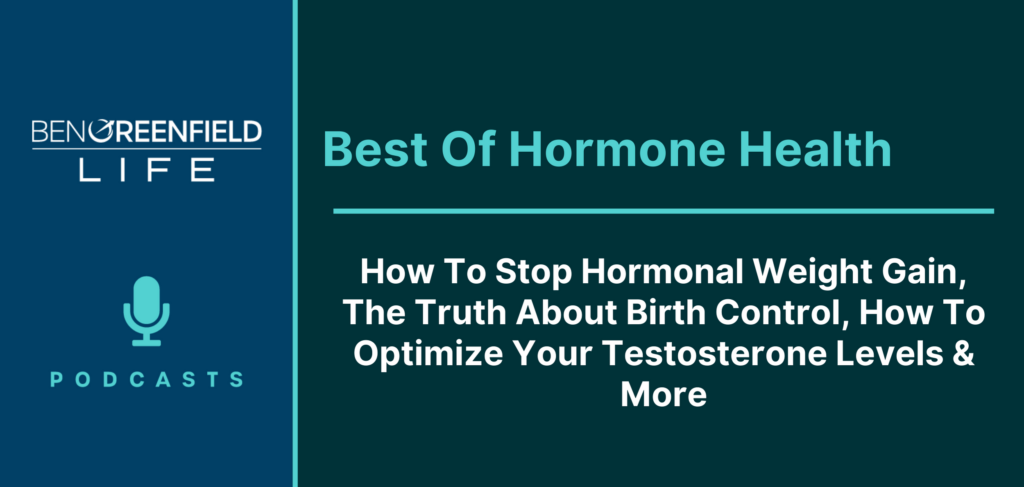

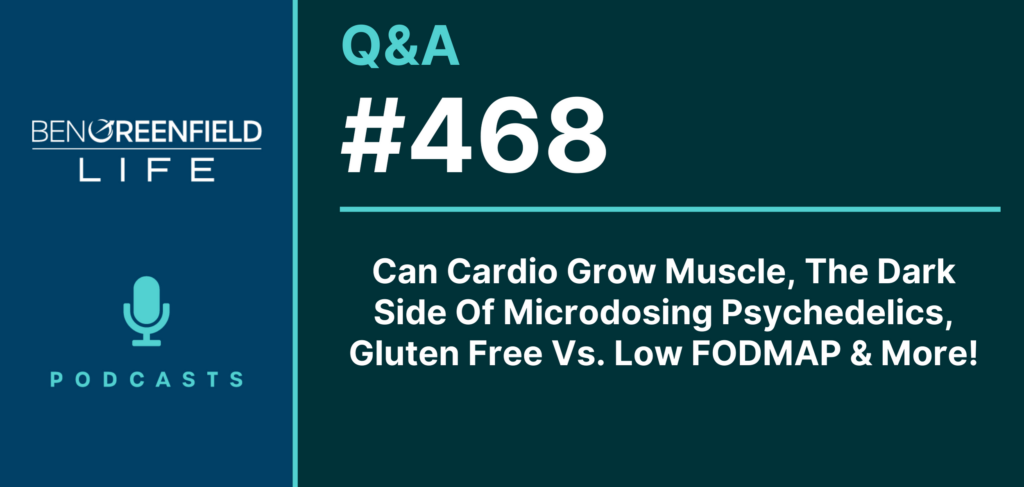
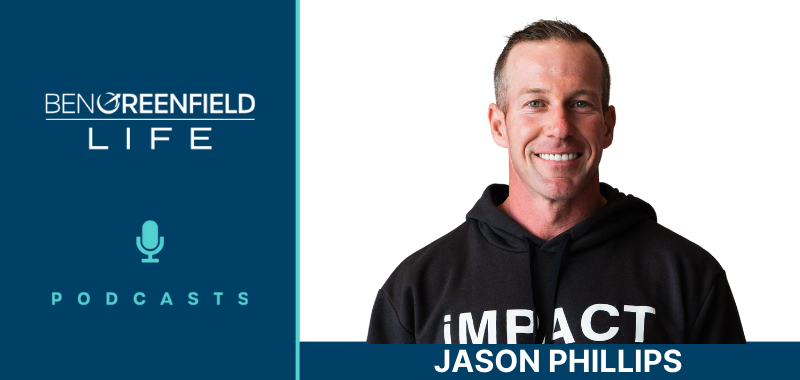






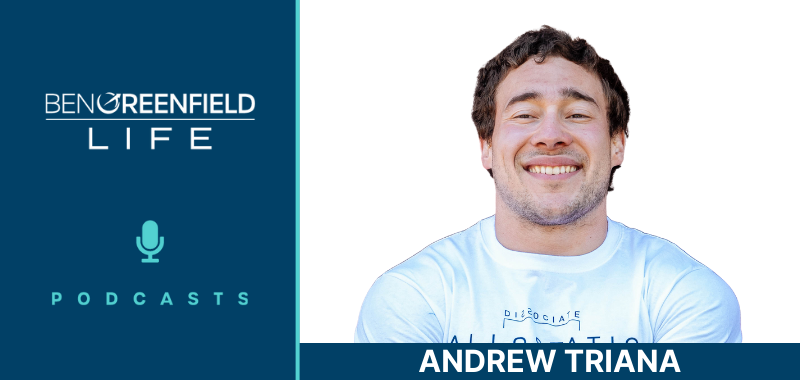
Excelente información. Muy completo el artículo. Saludos
Hey Ben! I have down the DUTCH test several times, and suffer from LOW cortisol production and my cortisol curve is almost flat line. Crazy over training (pro fighter) over many years and too much mental stress + anxiety, poor recovery strategies or training strategies, not good balance in life in general. It has been 1.5 yrs from my first DUTCH test and trying to recover from a “burnout” / adrenal + hormone issues / over-training. ANY good suggestions for strategies to bring cortisol UP? it has made very little progress in coming up in the past 1.5 years. Thanks!
Hi Ben-
I have IBD and seem to flare whenever i get an infection so its important i keep my immune system strong. However, in addition to flaring, i seem to take very long to recover from illness/infection and get the “Post-viral fatigue” that makes me feel adrenally shot for about a week or two after infection- should i focus heavily on stress reduction during this time?
Any thoughts to recovering and beating the post illness fatigue?
I think it's always a good idea to focus on reducing stress, but especially when you're sick. Your question on post-illness fatigue would be a good one to call into the podcast: https://speakpipe.com/bengreenfield
Yes! I am so interested in this too! I have been suffering crippling post viral fatigue for nearly a year following an Epstein-Barr virus reactivation. I just left you a voice memo / question with this too. Any info to help with such a debilitating condition would be amazing :-)
Hi Ben thanks so much for publishing this list. It took me over a year to find articles about these supplements and how they relate to cortisol. There are still a few new ones in your article that i hadn’t researched yet.
One i would like to add is taurine. I found taurine and niacin, i take the inositol hexanicotinate form, work best for me.
All the best
Amazing information as always! Thanks so much for continually providing your readers with so much incredibly valuable information every week. Stress is a major problem right now for most Americans. 2020 has been a very rough year. Thanks.
Hey Ben,
Great info in this article as usual!! Is there a supplement or product that combines most of the adaptogenic into one that you would recommend?!?
TianChi has a few, but not all: https://getkion.com/shop/body/tianchi-chinese-ada…
I’m going to try these out…I’m trying to do things more natural and would stop caffeine and sugar and other things that which stressed me out. any anxiety means here IBS due to anxiety?